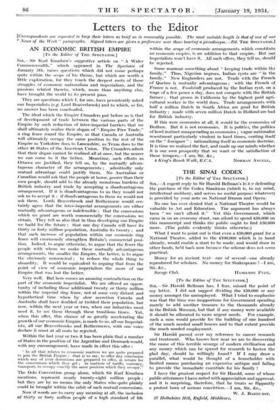Letters to the Editor
[Correspondents are requested to keep their letters as brief as is .reasonably possible. The most suitable length is that of one of our " News of the Week" paragraphs. Signed letters are given a preference over those Waring ci Pieudonym Tag SPECTATOR.]
AN ECONOMIC BRITISH EMPIRE
[To the Editor of THE SPECTATOR.] Sin,—Sir Karl Knudsen's suggestive article on " A Wider Commonwealth," which appeared in The Spectator of January 5th, raises questions which did not come perhaps
quite within the scope of his theme, but which are worth a little exploration, for they touch the deepest roots of those struggles of economic nationalism and imperialism, and the passions related thereto, which, more than anything else, have brought the world to its present pass.
They are questions which I, for one, have persistently asked
our Imperialists (e.g. Lord Beaverbrook) and to which, so far, no answer has been vouchsafed.
The ideal which the Empire Crusaders put before us is that of development of trade between the various parts of the Empire by such reduction of inter-imperial barriers that we shall ultimately realize their slogan of " Empire Free Trade," a ring fence round the Empire, so that Canada or Australia will ultimately occupy the same position to the rest of the Empire as Yorkshire does to Lancashire, as Texas does to the other 48 States of the American Union. The Crusaders admit that their slogan cannot be realized all at once, but the nearer we can come to it the better. Meantime, such efforts as Ottawa are justified, they tell us, by the mutually advan- tageous character of the arrangements ; admittedly only mutual advantage could justify them. No Australian or Canadian would ask that the people at home, poorer than their own people, should add to the already monstrous burdens of British industry and trade by accepting a disadvantageous arrangement. If it is disadvantageous to us they would not ask us to accept it ; if disadvantageous to them we would not ask them. Lords Beaverbrook and Rothermere would cer- tainly agree that the inter-imperial arrangements are either mutually advantageous or indefensible; that the concessions which we grant are worth commercially the concessions we obtain. They tell us also that in thus developing our Empire we build for the future ; that one day Canada will have its thirty or forty million population, Australia its twenty ; and that such increase of population within our economic ring fence will enormously strengthen Britain's commercial posi- tion. Indeed, to argue otherwise, to argue that the fewer the people with whom we make these mutually advantageous arrangements, the smaller the Empire, the better, is to argue the obviously nonsensical ; to reduce the whole thing to absurdity. - It would be equivalent to arguing that from the point of view of economic imperialism the more of our Empire that was lost the better.
Very well. But here comes an amazing contradiction on the part of the economic imperialist. We are offered an oppor- tunity of including those additional twenty or thirty million within the imperial ring fence, not at some very distant and hypothetical time when by slow accretion Canada and • Australia shall have doubled or trebled their population, but
now, within the next year or two, when our industries most need it, to see them through these troublous times. -Yet, - when this offer, this chance of so greatly accelerating the
growth of our economic Empire, is made to us, all our Imperial- ists, all our Beaverbrooks and Rothermeres, with one voice declare it must at all costs be rejected.
Within the last year or two it has been plain that a number of States in the position of the Argentine and Denmark would, with any encouragement, have made in effect this offer : " In all that relates to economic matters we are quite prepared to join the British Empire : that is to say, to offer any concession which any of your dominions are prepared to offer, in return for the concessions which they get ; in matters of ariffs, currency, transport, to occupy exactly the same position'which they occupy."
The Oslo Convention group alone, which Sir Karl Knudsen mentions, represent nearly twenty-eight million people ; but they are by no means the only States who quite plainly could be brought within the orbit of such mutual concessions.
Now if words are to carry any meaning at all, the inclusion of thirty or forty million people of a high standard of life within the scope of economic arrangements which constitute. an economic empire, is an -addition to that empire, - But our imperialists won't have it. All such offers, they tell us, should' be rejected. -- • Some murmur something about " keeping trade within the family." Thus, Nigerian negroes, Indian ryots are " in the family." New Englanders are not. Trade with the French of Quebec is mutually advantageous ; with the French of France is not. Foodstuff produced by the Indian ryot, on a wage of a few pence a day, does not compete with the British farmer ; that grown in California by the highest paid agri- cultural worker in the world does. Trade arrangements with half a million Dutch in South Africa are good for British industry ; made with seven million Dutch in Holland are bad for British industry.
If this were economics at all, it would be the economics of Bedlam. But it is not economics. It is politics, the polities of herd instinct masquierading as economics ; vague nationalist resentment particularly virulent in hard times, venting itself on the " foreigner " ; rationalizing itself as economic doctrine. It is time we realized the fact, and made up our minds whether it our own prosperity that we want or the satisfaction of those tempers.—I am, Sir, &c.,
4 King's Bench Walk, E.C.4. NORMAN ANGELL.








































 Previous page
Previous page